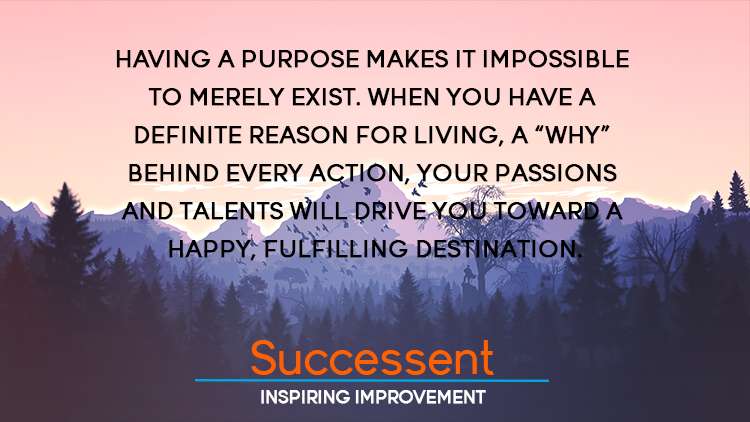How to find your purpose in life and why you need it, having a purpose, a mission that we must fulfill, makes us live longer and happier lives.
“The mystery of human existence is not only to stay alive but to find a reason to live” – Fyodor Dostoyevsky

An investigation conducted with 136,000 people in Japan and the United States found that those who had no purpose of living had a 20% greater chance of dying sooner than those who had it.
“Woe to the one who did not find more meaning in his life! Without an objective, without a purpose, and therefore, without any reason to continue. Soon we lost it, ” Viktor Frankl, the Austrian psychiatrist who survived three years in the Nazi concentration camps, who was able to see first-hand how to have a mission to fulfill, helped people survive the harshest conditions imaginable.
The impact of the purpose is also powerful in companies. An analysis of the human resources consultant Towers Watson carried out in 50 global companies, found that organizations that showed low scores in the level of commitment of their employees to the organization had an operating margin 10 percent lower than the average of the study.
The companies where the commitment was more significant enjoyed an operating margin 27% higher than the average.
And what is the factor that best predicts the commitment of employees within the company? The purpose. Another investigation carried out in 2013 with 12,000 employees found that those who felt that their work had a purpose, were more committed to their company and registered almost twice as much job satisfaction.
Maybe you are interested: If you don’t know what to do with your life read this
Finding your purpose
Perfect, we already know that giving a purpose to our life is essential, now how can we find it? Before starting, if you still do not know what your mission in life is, do not worry, you are in good company. Most people do not know it.
Another thing that I would like to clarify is that there is nothing like a metaphysical purpose that the universe has conspired to give us. That is to say, when we are born, we do not come with a predetermined mission. I’m sorry to disappoint you, but nowhere is it written that you were born with the mission to save the world from the aliens or the murderous computers.

Human beings are animals that have evolved to reach the development we have today. But we are still animals; our genetic code is 98% similar to that of chimpanzees.
Animals have no destiny to fulfill imposed by the universe. You will never find a monkey with his elbow on his leg and his hand on his jaw, thinking anguished, ‘what is my mission in life?’ Neither do dogs or fleas get anxious about it. They need to survive.
But not us, or at least, should not. Since we enjoy the enormous benefit of intelligence, and that we can do great things for the benefit of others, we have a moral obligation to try to do something productive with our lives. And, by the way, make it more lasting and happy.
Our purpose is not something we find; it’s something we create. For this, we rely on our passions, skills, values and the needs of society.
Let’s take an example. Let’s say that since childhood you’ve been passionate about cooking, thanks to that predilection you have developed a great ability between fires. When you start asking what to do with your life, it would be reasonable to start there, for what you like so much: the cooking.
Your passion and skills have pointed out that the kitchen could be your destination, now, what you believe in, your values can determine what type of cooking you will do or the kind of restaurant you will have.
If you can not stand the suffering of animals, you likely decide on a vegetarian restaurant. Or maybe your thing is to help people with limited resources access to quality food, so you lean towards a low-cost restaurant. If your concern is health, perhaps an organic food restaurant is your best option. And so on.
Another example, to compulsive readers, it is reasonable that they end up becoming writers. The type of writing will depend mainly on their values. Leo Tolstoy, the great Russian novelist, believed that novels should educate people, that is why his works refer to the high moral dilemmas facing humanity. Other writers consider that their works must, above all, entertain, and write lighter novels with fewer pretensions.
How to find your purpose in life
There is an exercise that gave me excellent results. For a few days, maybe a week, every morning when I got up, I would pick up a pencil and paper and ask myself these three questions: Who am I? What do I want? What do I believe?
The reason for doing so for several days is because repetition allows us to dig deeper and arrive at better answers. Usually, the first answers that come to our mind are not the best. Thinking again and again, about the same helps us to have greater clarity.
The first question, who am I? (father, husband, son, architect, economist). Largely determines the second, what do I want? A forty-year-old married and with children do not want the same thing as a twenty-year-old.
The third question helps you discover your values, what you believe in, and what you would like to promote.
After asking the three questions, the most natural thing is that several options arise from which you can choose what to dedicate your life to. Choose one and start walking. You will see how the action brings clarity.
Give direction to our lives is one of the great things we can do because it is not enough to be alive, as Fyodor Dostoyevsky said, “We must find something to live for .”
